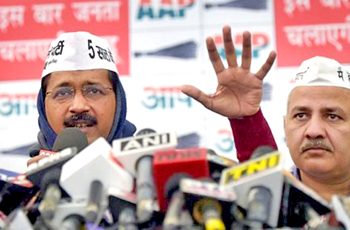New Delhi, Feb 3: Coming down hard on AAP, Union Finance Minister Arun Jaitley today said the party was caught "red-handed" in receiving funds through "round-tripping" from companies which did not have any business and accused it of adopting "diversionary tactics" to deflect attention.

Jaitley called the Rs 2 crore donation through cheques of Rs.50 lakh each by four companies to AAP a clear case of "round-tripping of black money" and indicated that a probe will be initiated into it by the concerned authorities.
AAP Volunteer Action Manch (AVAM), a breakaway group of the Aam Aadmi Party, yesterday had accused the Arvind Kejriwal-led party of receiving Rs 2 crore last year through four "dubious" companies.
The AAP has rejected the charges and demanded a Supreme Court-monitored Special Investigation Team (SIT) to probe funding of all three major parties in Delhi polls.
"It is obvious that this is a round-tripping of black money into the system of a political party. Now, if you are perhaps trapped in an incident of this kind, this is no position that you should start blaming other political parties and try and deflect the agenda," he said.
On AAP seeking a Supreme Court-monitored probe into funding of the three major parties in Delhi polls, Jaitley said, "These are all diversionary tactics. AAP and its leadership has been caught red-handed in this case.
"I'm sure the statutory authorities will do their job as and when their returns are filed and as and when the facts are brought to their notice."
Asserting that it adopted "total transparency" in its funding, AAP accused BJP of attempting to influence the voters ahead of the February 7 polls by bringing out "false" allegations.
Rejecting AAP's argument that it received the donations through cheques, Jaitley said, "The elementary question is when you give your money by cheque, who is the controlling interest behind that company, the party is supposed to know that."
He further said it was "obvious that these comnpanies have been used as pass-through entities, transacted through hawala means or through companies which convert that money and give entries in white money to others."
Jaitley said AAP has to answer who were behind these companies and what was their source of income.






Comments
Add new comment